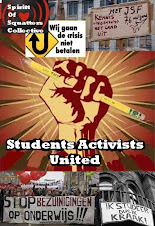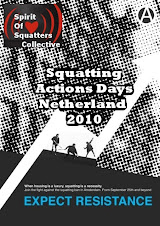More parts would come...
Call out
Public Inspection of a Monsanto Facility
Enkhuizen, Tuesday morning 2 November 2010
Food security in times of climate change?
1-5 Nov agro industry lobbies, powerful governments, the UN, and Worldbank are getting together in the conference It’s down 2 Earth in The Hague preparing for the climate summit COP16 this November in Cancun, Mexico. They come up with technological solutions when what we need is a system change.
1. Get you hands off our lands and food!
Multinationals are monopolizing our food supply. They are chemical companies selling pesticides and artificial fertilizers. These multinationals develop patented GM crops, buy up seed companies, and tell greenwash stories to sell more chemicals and make more money. Large agribusiness, such as Monsanto and Syngenta, have other agendas and priorities than food security or fighting climate change. Their practices threaten small-scale farming and peoples’ food sovereignty around the world.
2. Our climate is not for sale!
One of the main drivers of deforestation and CO2 pollution is industrial agribusiness, mainly with soy crops and palm oil monocultures. Monsanto is lobbying hard for carbon credits for their GM Roundup Ready soybeans because these would contribute to the reduction of CO2. But in reality the soy is transported all over the globe and nearby communities get poisoned with Roundup pesticide, loose their own food production, end up in the slums.
3. Food sovereignty – no food monopolies!
The only way to enable people around the world to feed themselves is to establish food sovereignty: local community control over lands, seeds, water and sustainable agricultural processes. This can only be achieved by getting rid of monopolising, profit-seeking corporations and speculators like Monsanto and Syngenta. Small-scale agriculture not only contributes positively to the carbon balance of the planet, it also gives employment to 2.8 billion people. It remains the best way to combat hunger, malnutrition and the current food crisis. It uses less fossil fuels, takes local ecosystems into account and does not poison the environment with pesticides.
To get real ‘climate smart agriculture’ we need to start with getting the truth out and reveal the corporate lies about the current agriculture system. Let’s bring out Monsanto’s Hidden Agenda with a Public Inspection!
Achtergrond / Background info
Deels in het Engels, deel in het Nederlands | Partly in Dutch, Partly in English
* Civil Society statement of concern on the Hague Conference on Agriculture, Food Security and Climate Change
This letter by civil society outlines concerns about a high level meeting "Down 2 Earth" at the Hague on agriculture, food security and climate change.
http://www.iatp.org/climate/files/document/civil%20society%20statement_hague_0.pdf
* New scientific report: GM soy Sustainable, Responsible? (September 2010)
The cultivation of Genetically Manipulated Roundup Ready RR soy endangers human and animal health, increases herbicide use, damages the environment, and has negative impacts on rural populations. The monopolistic control by agribusiness companies over GM RR soy technology and production endangers markets, compromises the economic viability of farming, and threatens food security. In light of these impacts, it is misleading to describe GM RR soy production as sustainable and responsible. To do so sends a confusing message to consumers and all in the supply chain, interfering with their ability to identify products that reflect their needs and values. Proponents of GM RR soy are invited to address the arguments and scientific findings in this paper and to join in a transparent, science based inquiry into the principles of sustainability and soy production.
http://www.gmwatch.org/file/GMsoy_SustainableResponsible_Sept2010_Summary.pdf
* UN: Agriculture at a Crossroads (UN 2008)
Synthesis for Scientific Report report The International Assessment of Agricultural Knowledge, Science and Technology for Development (IAASTD)
This Synthesis Report captures the complexity and diversity of agriculture and agricultural knowledge, science and technology across world regions. The diversion of agricultural crops to fuel can raise food prices and reduce our ability to alleviate hunger throughout the world. The negative social effects risk being exacerbated in cases where small-scale farmers are marginalized or displaced from their land. From an environmental perspective, there is considerable variation, uncertainty and debate over the net energy balance and level of greenhouse gas (GHG) emissions. In the long term, effects on food prices may be reduced, but environmental effects caused by land and water requirements of large-scale increases of first generation biofuels production are likely to persist and will need to be addressed.
"Although considered by many to be a success story, the benefits of productivity increases in world agriculture are unevenly spread. Often the poorest of the poor have gained little or nothing; and 850 million people are still hungry or malnourished with an additional 4 million more joining their ranks annually. We are putting food that appears cheap on our tables; but it is food that is not always healthy and that costs us dearly in terms of water, soil and the biological diversity on which all our futures depend." — Professor Bob Watson, director, IAASTD
http://www.agassessment.org/reports/IAASTD/EN/Agriculture%20at%20a%20Crossroads_Synthesis%20Report%20%28English%29.pdf
* Duurzaam nieuws 21-09-2010: Wondergewas stelt teleur
Indiase deelstaten die vijf jaar geleden nog vol vuur waren over de toekomstmogelijkheden die de teelt van jatropha bood, zijn nu heel stil geworden. Chhattisgarh maakte zich in 2005 sterk de belangrijkste leverancier van biodiesel in India te worden, maar de website van de Chhattisgarh Bio-fuel Development Authority meldt sinds 2008 geen belangrijke verwezenlijkingen meer.
http://www.duurzaamnieuws.nl/bericht.rxml?id=59089&title=Bio%20dieselt%20niet%20goed%20in%20India
* Agriculture and climate change: Real problems, false solutions
Preliminary report by Grupo de Reflexion Rural, Biofuelwatch, EcoNexus and NOAH – Friends of the Earth Denmark – Bonn, June 2009
"The development of the bio-economy implies that huge areas of the planet will be turned over to massive monocultures of biomass raw material for processing in biorefineries. This prioritises the use of biomass for economic purposes over ecological purposes such as protecting biodiversity or ecosystems. Furthermore demand is potentially limitless as massive increases in energy consumption are predicted. This is compounded by the fact that plant biomass has low energy density in comparison with the fossil fuels it is meant to replace. The development of the bio-economy would further extend all the well-documented impacts of industrial agriculture on soils, water, biodiversity, ecosystem integrity, small-scale farmers, local communities and indigenous peoples. It could signal the end of major tracts of forest and other vital ecosystems. The irony is that this would all take place in the name of tackling climate change." "Land that is classified as marginal often has great value to people, biodiversity and ecosystems and for climate stabilisation. Turning it over to industrial cropping for food or fuel may increase regional and global climate change."
http://www.econexus.info/pdf/agriculture-climate-change-june-2009.pdf
* Rapport Veredelde Zaken
De toekomst van de plantenveredeling in het licht van de ontwikkelingen in het octrooirecht en het kwekersrecht WUR – 2009
"De wereldwijde omzet van groentezaden is jaarlijks ongeveer € 2.7 miljard. Tengevolge van de concentratie die de afgelopen decennia jaar heeft plaatsgevonden wordt deze omzet voornamelijk gerealiseerd door de activiteiten van slechts negen professionele zaadbedrijven. De zaden vormen de basis voor een markt met een geschatte jaaromzet van € 250 miljard. De markt voor groentezaden neemt jaarlijks met 5-7% toe; groenten behoren tot de belangrijkste voedselproducten en zijn goed voor de gezondheid van de mens." (P.13)
Op mondiaal niveau hebben de grootste bedrijven hun marktaandeel aanzienlijk weten te vergroten, van 8% voor de top-tien in 1985 to bijna 30% in 2006. Dit is het resultaat van overnames en samengaan van bedrijven. Ter illustratie: De bedrijven Sandoz en Ciba Geigy gingen op in het nieuwe bedrijf Syngenta; grote delen van Advanta (voorheen vanderHave) komen in de kolom van 2006 terug onder Limagrain, en Seminis, Dekalb/Asgrow en de zaadafdeling van Cargill (en sinds 2007 ook Delta & Pine Land) zijn nu onderdeel van Monsanto.
Tabel 3.4 laat de dominantie zien van de zogenaamde geïntegreerde 'life sciences' bedrijven zoals Monsanto, Dupont, Syngenta and BayerCropScience, die naast zaden belangrijke afdelingen in andere gebieden hebben, met
name gewasbeschermings- en geneesmiddelen." (P.33)
- Cijfers over overnames in de mondiale en Nederlandse zaadindustrie: P.27
http://documents.plant.wur.nl/cgn/literature/reports/VeredeldeZaken.pdf
* Small Farmers' Solutions to the Biodiversity Crisis
Press Release- La Via Campesina 26 oktober 2010
What we call "agrofuels" are actually not sustainable and do not constitute a renewable source of energy. It is really no solution to climate change, or of any benefit to farmers, indigenous people or local communities, but just a way for agribusiness to make more money".
http://viacampesina.org/en/index.php?option=com_content&view=article&id=961:small-farmers-solutions-to-the-biodiversity-crisis&catid=22:biodiversity-and-genetic-resources&Itemid=37
* Wereldbank vreest nieuwe voedselcrisis
Duurzaam nieuws 23-10-2010
De Wereldbank heeft haar Voedselcrisisprogramma (GFRP) gereactiveerd en tot 760 miljoen dollar beloofd voor landen die het risico lopen op een nieuwe voedselcrisis. In 2007 en 2008 braken in diverse landen rellen uit door gebrek aan voedsel. De uitbreiding van het programma is een reactie op aanhoudende zorg in sommige landen over de volatiliteit van de voedselprijzen en onzekerheid op de voedselmarkt, zei Robert Zoellick, voorzitter van de Wereldbank, bij de aankondiging ervan. [..]
Volgens Neil Watkins van ActionAid wordt de prijsvolatiliteit veroorzaakt door een internationale markt die steeds sterker beïnvloed wordt door de vraag naar biobrandstoffen, zoals ethanol uit maïs. Die markt is afhankelijk van de grillen van handelaren.
"Omdat steeds meer investeerders zich op de voedselmarkt storten, wordt deze markt minder het terrein van echte kopers en verkopers en meer het terrein van de financiële wereld", zegt hij. Instituten beginnen volgens hem wel in te zien dat ze plaatselijke gemeenschappen minder kwetsbaar kunnen maken voor de grillen van de internationale markt. Dit kan door te investeren in kleine boeren die produceren voor de plaatselijke markt.
http://www.duurzaamnieuws.nl/bericht.rxml?id=59768&title=Wereldbank%20vreest%20nieuwe%20voedselcrisis%
Visualizing Consolidation in the Global Seed Industry: 1996–2008
The commercial seed industry has undergone tremendous consolidation in the last 40 years as transnational corporations entered this agricultural sector, and acquired or merged with competing firms. This trend is associated with impacts that constrain the opportunities for renewable agriculture, such as reductions in seed lines and a declining prevalence of seed saving. To better characterize the current structure of the industry, ownership changes from 1996 to 2008 are represented visually with information graphics. Since the commercialization of transgenic crops in the mid-1990s, the sale of seeds has become dominated globally by Monsanto, DuPont and Syngenta. In addition, the largest firms are increasingly networked through agreements to cross-license transgenic seed traits.
The full report that is online available: http://www.mdpi.com/2071-1050/1/4/1266/pdf
De wereld volgens Monsanto
Film over de schandalen rond Monsanto.
Wie windt zaait zal storm oogsten - over de monopolisering van zaaizaad,
Brochure van A SEED Europe
http://www.aseed.net/index.php?option=com_content&task=view&id=746&Itemid=1
Who benefits from GM crops 2010
http://www.foei.org/en/resources/publications/pdfs/2010/publications
Landbouwministers verzetten zich tegen Dalli's plannen
About how politicians are baised towards agro business:
http://www.gentech.nl/alle_berichten/europa/landbouwministers_verzetten_zich_tegen_dalli_s_plannen
José Bové: bestuursvoorzitter EFSA werkt voor industrielobby
About the corruption in the EU
http://www.gentech.nl/alle_berichten/europa/jose_bove_bestuursvoorzitter_efsa_werkt_voor_industrielobby
South American GM Soy close to get Carbon credits – Agribusiness lobby in the Climate negotiations
http://www.lasojamata.net/es/node/397

Spirit Of Squatters Collective
Spirit Of Squatters Collective : This is solidarity action (like most of our videos). The solidarity is stronger when it is seen by as many people as possible.So...Please use it ! Pass this info to everybody who could be interested !!!
Feel free to embed,link it,send it,screen it etc. Use it=don't loose it. Reclaim the media with us !
... So get inspired. TOGETHER WE ARE STRONGER !!!
 http://www.youtube.com/user/spiritofsquatters
http://www.youtube.com/user/spiritofsquatters Spirit Of Squatters Collective is always trying to report and support good things what are happening around us. We trying at least one time a week show You some news. Our goal is to do it daily but 1st we can not be everywhere and 2nd We don't have enough time mainly to edit ( there are many projects waiting for their time...) That's why we waiting for You to help us support good things with our video channel and with creating independent media.
and that's few words from our pages:
With our activities we want to make this world a better place.Reclaim the media with us.Feel free to use our videos.Now all up to you !!!Real life is beginning when you turn off the tv, computer. See you on the streets in actions !!!
If You think its important and good what we are doing You can donate what can help us to find more time to improve our activity. Click here:
 http://ourmediaindymedia.blogspot.com
http://ourmediaindymedia.blogspot.com OR EVEN BETTER YOU CAN OFFER US WORK.Thanks !!!
WATCH!
READ!
THINK!
REALIZE!
TALK!
COMMUNICATE!
LISTEN!
DEFEND!
DESTROY!
CREATE!
CHANGE!
GET INSPIRED!
RECLAIM MEDIA WITH US!
JOIN US!
FIGHT FOR YOUR RIGHTS!
LOVE !!!
SQUAT!


No comments:
Post a Comment